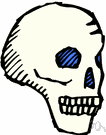skull
Also found in: Thesaurus, Medical, Acronyms, Idioms, Encyclopedia, Wikipedia.
skull
the skeleton of the head
Not to be confused with:
scull – either of a pair of small oars used by a single rower; a small boat propelled by a scull or a pair of sculls
Abused, Confused, & Misused Words by Mary Embree Copyright © 2007, 2013 by Mary Embree
skull
(skŭl)n.
1. The bony or cartilaginous framework that encloses and protects the brain and sense organs of all vertebrates and of one group of nonvertebrates (the hagfishes); cranium.
2. Informal The head, regarded as the seat of thought or intelligence: Use your skull and solve the problem.
3. A death's-head.
[Middle English sculle, probably of Scandinavian origin.]
American Heritage® Dictionary of the English Language, Fifth Edition. Copyright © 2016 by Houghton Mifflin Harcourt Publishing Company. Published by Houghton Mifflin Harcourt Publishing Company. All rights reserved.
skull
(skʌl)n
1. (Anatomy) the bony skeleton of the head of vertebrates. See cranium
2. often derogatory the head regarded as the mind or intelligence: to have a dense skull.
3. (Heraldry) a picture of a skull used to represent death or danger
[C13: of Scandinavian origin; compare Old Norse skoltr, Norwegian skult, Swedish dialect skulle]
Collins English Dictionary – Complete and Unabridged, 12th Edition 2014 © HarperCollins Publishers 1991, 1994, 1998, 2000, 2003, 2006, 2007, 2009, 2011, 2014
skull
(skʌl)n.
1. the bony or cartilaginous framework of the vertebrate head, enclosing the brain and sense organs and including the jaws.
2. the head as the center of comprehension; mind.
[1175–1225; Middle English scolle < Old Norse skalli]
skull′-less, adj.
skull′-like`, adj.
Random House Kernerman Webster's College Dictionary, © 2010 K Dictionaries Ltd. Copyright 2005, 1997, 1991 by Random House, Inc. All rights reserved.
skull
(skŭl) The part of the skeleton that forms the framework of the head, consisting of the bones that protect the brain and the bones of the face. See more at skeleton.
The American Heritage® Student Science Dictionary, Second Edition. Copyright © 2014 by Houghton Mifflin Harcourt Publishing Company. Published by Houghton Mifflin Harcourt Publishing Company. All rights reserved.
Skull
a school or shoal of fish.Dictionary of Collective Nouns and Group Terms. Copyright 2008 The Gale Group, Inc. All rights reserved.
skull
Twenty-two bones forming the frame of the head. All interlock rigidly except the hinged lower jawbone (mandible).
Dictionary of Unfamiliar Words by Diagram Group Copyright © 2008 by Diagram Visual Information Limited
ThesaurusAntonymsRelated WordsSynonymsLegend:
Switch to new thesaurus
| Noun | 1. |  skull - the bony skeleton of the head of vertebrates skull - the bony skeleton of the head of vertebratescraniometric point - a landmark on the skull from which craniometric measurements can be taken cheekbone, jugal bone, malar, malar bone, os zygomaticum, zygomatic, zygomatic bone - the arch of bone beneath the eye that forms the prominence of the cheek cranial orbit, eye socket, orbital cavity, orbit - the bony cavity in the skull containing the eyeball endocranium - membrane lining the inside of the skull head, caput - the upper part of the human body or the front part of the body in animals; contains the face and brains; "he stuck his head out the window" jaw - the part of the skull of a vertebrate that frames the mouth and holds the teeth axial skeleton - the part of the skeleton that includes the skull and spinal column and sternum and ribs vomer - thin trapezoidal bone of the skull forming the posterior and inferior parts of the nasal septum |
Based on WordNet 3.0, Farlex clipart collection. © 2003-2012 Princeton University, Farlex Inc.
skull
nounCollins Thesaurus of the English Language – Complete and Unabridged 2nd Edition. 2002 © HarperCollins Publishers 1995, 2002
Translations
جُمْجُمَةجُمْجُمَه
lebka
hovedskalkranium
kranio
koljukolppealuu
pääkallokallo
lubanja
koponya
hauskúpahöfuðkúpa
頭蓋骨頭骨
두개골
kaukolė
galvaskauss
craniu
lebka
lobanja
lobanja
skalle
กระโหลกศรีษะ
sọ
skull
[skʌl] N → calavera f (Med) → cráneo mskull and crossbones (= flag) → la bandera pirata
I can't get it into his (thick) skull that → no hay quien le meta en la cabeza que ...
Collins Spanish Dictionary - Complete and Unabridged 8th Edition 2005 © William Collins Sons & Co. Ltd. 1971, 1988 © HarperCollins Publishers 1992, 1993, 1996, 1997, 2000, 2003, 2005
skull
[ˈskʌl] n → crâne mskull and crossbones n → tête m de mortskull cap skullcap [ˈskʌlkæp] n → calotte fCollins English/French Electronic Resource. © HarperCollins Publishers 2005
skull
Collins German Dictionary – Complete and Unabridged 7th Edition 2005. © William Collins Sons & Co. Ltd. 1980 © HarperCollins Publishers 1991, 1997, 1999, 2004, 2005, 2007
skull
[skʌl] n (of live person) → cranio; (of dead person) → teschio (fam) (head) → testa, testonaskull and crossbones (danger warning) → teschio (flag) → bandiera dei pirati
Collins Italian Dictionary 1st Edition © HarperCollins Publishers 1995
skull
(skal) noun the bony case that encloses the brain. He's fractured his skull.
Kernerman English Multilingual Dictionary © 2006-2013 K Dictionaries Ltd.
skull
→ جُمْجُمَة lebka kranium Schädel κρανίο cráneo pääkallo crâne lubanja teschio 頭蓋骨 두개골 schedel hodeskalle czaszka crânio череп skalle กระโหลกศรีษะ kafatası sọ 头骨Multilingual Translator © HarperCollins Publishers 2009
skull
n. cráneo; calavera, estructura ósea de la cabeza;
base of the ___ → base del ___;
___ fractures → fracturas del ___.
English-Spanish Medical Dictionary © Farlex 2012
skull
n cráneoEnglish-Spanish/Spanish-English Medical Dictionary Copyright © 2006 by The McGraw-Hill Companies, Inc. All rights reserved.